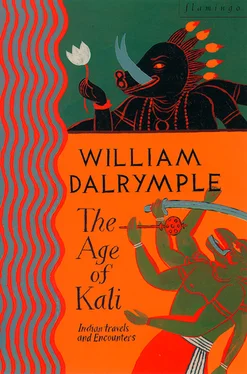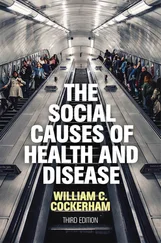That a sitting MP could be arrested for ordering a crowd to lynch and murder a civil servant was bad enough, but what happened next reveals quite how bad things have become in Indian politics in recent years. Anand Mohan Singh was arrested, but from his prison cell he contested and retained his seat in the 1996 general election, later securing bail to attend parliament. He recently distinguished himself during a parliamentary debate by snarling, ‘Say that again and I’ll come and break your teeth’ at an opponent on the other side of the Lok Sabha debating chamber. Justice in India being what it is, few believe that the police now have much chance of bringing a successful prosecution.
Over the years, my friends explained, violence had come to totally dominate almost every aspect of life in Bihar. It was said that in Patna no one bothered buying second-hand cars any more; instead armed gangs stopped vehicles in broad daylight, then forced the drivers to get out and sign pre-prepared sale deeds. As the Bihari government was too poor to pay the contractors who carried out public works, the contractors had been compelled to start kidnapping the government’s engineers and bureaucrats in order to get their bills paid. Other contractors, desperate for business, had taken to wreaking violence on each other: one report I had seen described a shoot-out in Muzaffarpur between the goondas of competing engineering companies after tenders had been put out to build a minor bridge in an obscure village. In some upper-caste areas, the burning of Untouchables had become so common that it was now almost an organised sport. Various lower-caste self-defence forces had formed in reaction, and were said to be busily preparing for war in villages they had rechristened with names like Leninnagar and Stalinpur. There were now estimated to be ten major private armies at work in different parts of Bihar; in some areas the violence had spun completely out of control, and was approaching a situation of civil war.
Bad things went on in Bihar, my friends told me: that was just the way it was. But the singularly horrific nature of the Barra massacre stuck in my mind, and a year later, when I found myself in Patna, I decided to hire a car and go and visit the village.
The road leading to Barra from Patna was much the worst I had ever travelled on in five years of living in India: although it was one of the principal highways of Bihar, potholes the size of bomb craters pitted its surface. On either side, the rusting skeletons of dead trucks lined the route like a succession of mementi mori.
As we drove, I had the feeling that I was leaving the twentieth century far behind. First the electricity pylons came to a halt. Then cars and trucks disappeared from the road; even the rusting skeletons vanished. In the villages, wells began to replace such modern luxuries as hand-pumps. We passed the odd pony trap, and four men carrying a palanquin. The men flagged us down and warned us about highwaymen. They told us to be off the roads by dark.
Eventually, turning right along a dirt track, we came to Barra. It was a small, ancient village raised above the surrounding fields on an old earthen tell. Its population was entirely Bhumihar: Brahmins who had converted to Buddhism at the time of the Emperor Ashoka, around 300 BC, and who had then been denied readmittance to the priestly caste when Indian Buddhism was wiped out by an aggressive Hindu revival a thousand years later. Bhumihars were still high-caste, but they had never quite regained the top place in the caste pyramid they had lost 250 years before the Romans first arrived in Britain.
I was taken around Barra by Ashok Singh, one of the two male survivors of the massacre. He walked me over to an embankment where a small white monument had been erected to the memory of the forty-two murdered villagers. A hot wind blew in from the fields; dust-devils swirled in the dried-out paddy. I asked: ‘How did you escape?’
‘I didn’t,’ he said. And pulling off a scarf, he showed me the lurid gash left by the sickle which had sliced off the back of his neck. ‘They cut me then left me for dead.’
Ashok began to describe, in detail, what had happened. He said that, as normal, he had gone to bed after eating his supper at eight thirty. The week before, there had been an atrocity when the Savarna Liberation Front, the (upper-caste) Bhumihar militia, had gang-raped and killed ten Harijan (Untouchable) women in the next district; but Barra was far from there, and no one was expecting trouble. Ashok, his brothers, father and uncle were all asleep on their charpoys when they were woken by the sound of explosions at ten thirty. They were frightened, and went to the women’s part of the house to alert their wives and mothers. The explosions and the sound of gunfire came closer. Then a burning splint was thrown on to the thatch of their roof. At the same time there was a shout from outside that everyone should come out and give themselves up, or else burn to death.
‘As soon as the roof caught fire my uncle and I began trying to put out the blaze. We didn’t take any notice of what was being shouted, so eventually these low people had to break down the door and drag us all out. There were hundreds of them, armed with guns, spears, bows, lathis and sickles. They left the women by our house, but they tied the men up with lengths of cloth.’
‘Did they say where they were from? What militia they were part of?’
‘No, but they were local men. We could tell by their accents. At first they left us lying where we were as they destroyed all the village houses with fire and dynamite. Then they said, “There is a meeting,” and they dragged us men to the edge of the village. There they made us sit in the middle of a circle. Then, one by one, they started killing us, right there where we were sitting. A great crowd was watching, but only two people were doing the killing, so it took a long time. I was very frightened. My mind went blank.
‘They killed all my brothers. They killed my father and they killed my uncle and my cousins. Eventually my turn came. One of the men pushed me forward and the other got his sickle and took three swipes. It made deep cuts on the back of my neck and head. I was senseless. The next thing I knew I woke up in hospital in Gaya. It was three weeks before I could get out of bed.’
‘You were very lucky.’
‘How can you say that? I lost eight of my kin.’
Ashok’s face crumpled, and he looked down. After some time, he again met my eyes: ‘I would like to take revenge,’ he said quietly, ‘but I don’t have the capacity.’
Ashok showed me the houses he and the widows of the village had erected with the compensation money they had been awarded by the government. They were miniature castles: tall and square, with no windows except for thin arrow-slits on the third storey. Unwittingly, they were almost exact miniature copies of the Peel Towers erected across the Scottish borders in the sixteenth century, when central authority had completely broken down. There could be no better illustration of Bihar’s regression in to the Dark Ages.
Ashok rubbed the huge scar on his neck and said: ‘Now the Harijans refuse to work on our fields, and there are not enough Bhumihar men left to till them ourselves. When the Harijans pass us on the road, they pass comments at us: “We have not finished with you yet,” or “You will meet the same fate as your brothers.” These low people are enjoying what has happened. They have grown fat and behave like they are Brahmins. But us Bhumihars, every night after sunset we are frightened. Every night I have nightmares. They may come again. What is to stop them? The police and the [Bihari] government of Laloo Prasad Yadav are on their side. This massacre was his handiwork.’
Читать дальше












